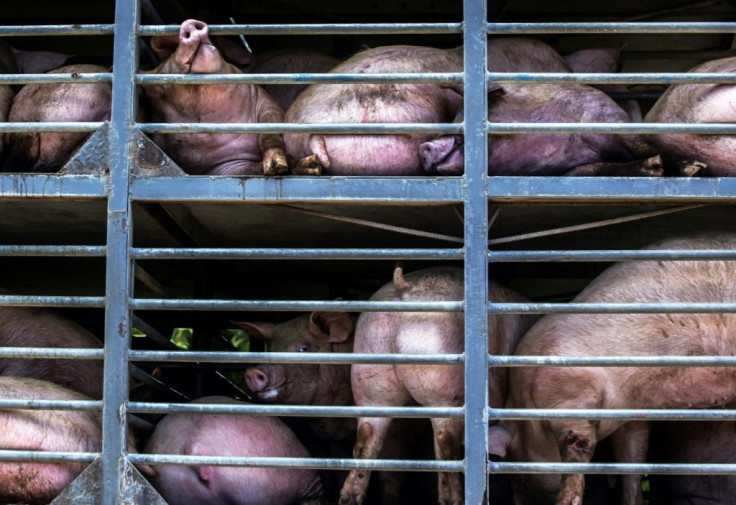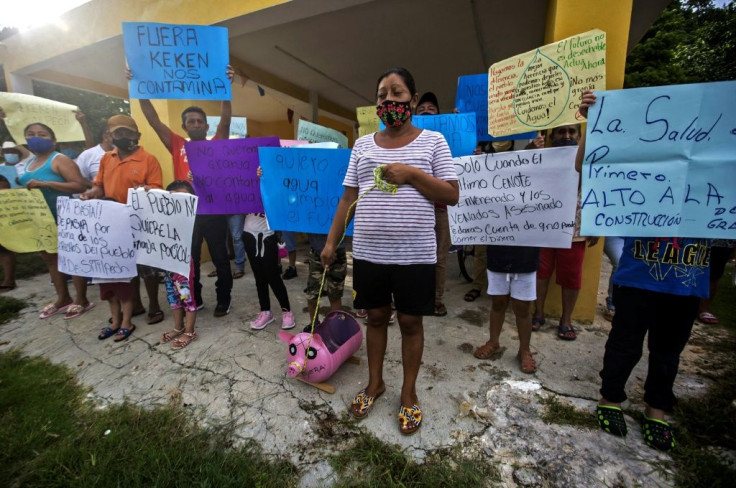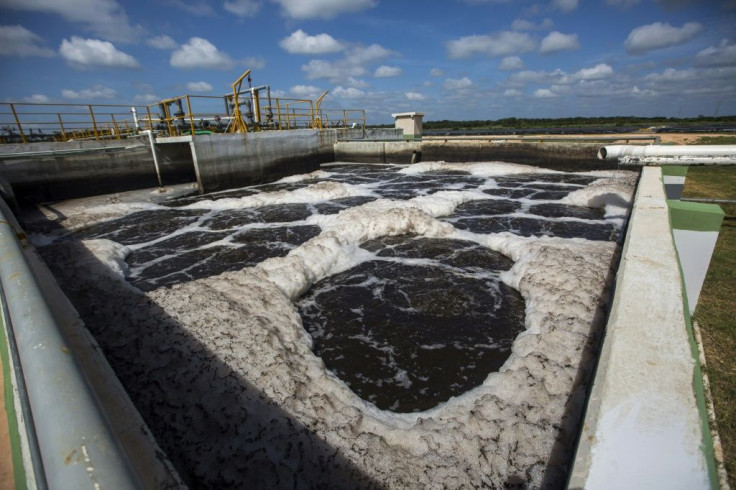Pig Farms Accused Of Defiling Mexico's 'Sacred Wells'
Long revered by the Maya people as sacred and today a magnet for tourists, local indigenous communities fear the water-filled sinkholes of Mexico's Yucatan Peninsula are under threat from industrial pig farms.
Known as cenotes, the thousands of cavities are part of a vast labyrinth of caves connected to a giant aquifer under the lush jungle of a region known as the "Riviera Maya."
For the indigenous people who inhabit the area in southeast Mexico, they are a source of drinking water that their ancestors called "sacred wells."
"The area where we have our gift from God is like a sieve -- the water from all around goes down into the cenotes," said Doroteo Hau, an indigenous resident and tour guide.

Now the 62-year-old fears that the purity of the cenotes is being put at risk to satisfy burgeoning Asian demand for pork.
"They're going to destroy what we're taking care of," said Hau, who teamed up with other residents to form an organization called the Guardians of the Cenotes.
In May they managed to get Mexico's Supreme Court to ratify a suspension order for a farm with more than 45,000 pigs in Homun, home to 7,500 people. The case is under appeal.
If the complex reopens, Doroteo said that he is willing to "take up machetes" to defend the cenotes.

There are about 257 pig farms in the region, of which only 22 have submitted environmental impact studies, according to a report released by environmental group Greenpeace last year.
The environment ministry did not respond to AFP's request for comment the matter.

Often filled with stunning emerald or turquoise waters illuminated by a shaft of light from above, the sinkholes are a major attraction for snorkelers, scuba divers and other visitors.
"Tourists will stop coming if the bad smells get here," said taxi driver Jesus Dzul, who earns a living from visitors who come to swim in the crystal clear waters.
Residents of several communities accuse farms located in remote areas of dumping untreated waste in the jungle.
"The stench is too much... you can't breathe," 71-year-old Teodorita Rejon said with a gesture of disgust before a protest march in one village against a nearby pig farm.
One demonstrator dragged a plastic pig through the dirt streets shouting demands for the farms to close.

Mexican pork exports increased by nearly 30 percent in value in 2020, to $916 million, according to the US Department of Agriculture.
Sales to China, Mexico's second biggest customer for the meat after Japan, have skyrocketed in recent years, from $2 million in 2017 to $264 million in 2020.
An outbreak of African swine fever in China in 2018 and 2019 saw millions of pigs slaughtered to prevent an epidemic, driving up pork prices and demand for imports.
The stakes are so high that intimidation tactics are allegedly used against local communities.
"We're threatened by the people who work on the farms," resident Yolanda Chi said during a public consultation in which inhabitants mostly rejected the pig farms.
"They give them money to do it, but we're going to vote anyway," she said, as men nearby hurled insults at people participating in the referendum, which was not binding.
The pig farm owners insist that their waste management meets the necessary standards.
"We don't pollute anything," Alberto Alfonso of Grupo Porcicola Mexicano, the largest operator in Yucatan, told AFP.
He showed off systems used to treat organic waste during a tour of the complex.
But the author of the Greenpeace study, Viridiana Lazaro, maintains that samples taken from the cenotes and wells in the area indicate the presence of "contaminants."
Experts from the United Nations Development Program reported a similar finding.
"It's partly attributable to farms," said Xavier Moya, representative of the UN agency in the Yucatan.
Samples contained bacteria found in animal feces and traces of antibiotics, he said.
For Hau and other indigenous residents, the idea of the sacred cenotes being gradually destroyed by pollution is too much to bear.
"No, we can't take any more!" he said.
© Copyright AFP 2024. All rights reserved.




















